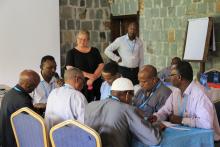WHO Ethiopia conducts the first sub-national Health Cluster Coordination training
Bishoftu, 31 May 2019 | Ethiopia is a country under pressure, faced with a wave of humanitarian emergencies ranging from conflict and population displacements to drought, food insecurity and malnutrition; and disease outbreaks.
“It is at times like these that we need to build and strengthen our capacity by ensuring that all our partners are equipped to coordinate the most effective response, as close to the emergency as possible” said Dr. Aggrey Bategereza, Officer in Charge, World Health Organization (WHO) Representative to Ethiopia.
Dr. Bategereza was speaking on the first day of a five day training which took place from 27-31 May 2019 in Bishoftu, Ethiopia, attended by 26 officers from the WHO Health Emergencies (WHE) team, Regional Health Bureaus, the Ethiopian Public Health Institute and several in-country NGO partners who make up the Ethiopia Health Cluster.
The Health Cluster is part of a global platform, led by WHO, which helps organizations work in partnership to ensure timely, effective and predictable response to health emergencies.
The training aimed to ensure a strong understanding of the roles and responsibilities of all stakeholders of the Ethiopia Health Cluster at national and sub-national levels, and to strengthen the participants’ capacity to lead and coordinate evidence-based humanitarian health interventions in emergencies. It consisted of theoretical and practical sessions including group works and simulation exercises.
After a successful week’s training, participants agreed that what now remains is translation of the knowledge into action.
“This training was a significant milestone for me,” commented Dr. Michael Oji, Deputy Incident Manager for the Ethiopian Somali Region., “It was a wonderful opportunity to further prepare and equip ourselves and our government colleagues to move cluster coordination in Ethiopia to the next level and support WHO strategic efforts to deliver quality health outcomes to the people in need”.
The course, which followed the Global Health Cluster (GHC) guidelines, was facilitated by WHO, the Office of Coordination for Humanitarian Affairs (OCHA) and the GHC.
